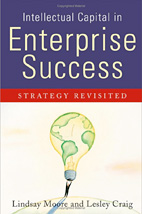I used to work at a dietary-supplements company. We read the authoritative herbals and identified herbs that the traditional knowledge of herbal folklore believed were efficacious in treating health conditions that were commonly served by modern over-the-counter (OTC) products. We reasoned that natural herbal solutions to widespread conditions such as the common cold, sleeplessness and lack of vitality could provide millions of consumers with a more natural lifestyle.
Knowledge and Economic Growth
The rise of our entrepreneurial society, the information economy, global capitalism, and modern prosperity are all inextricably linked together with the cultivation, dissemination, and management of knowledge. Increasingly, knowledge itself and the transfer of knowledge, are widely recognized as the key factors in long-term economic growth.
What is Knowledge Management?
Peter Drucker, the great patriarch and founder of management as a discipline, famously coined the term “knowledge workers” during the mid-twentieth century. “Knowledge workers” were the people who were being paid to think, to work with their brains instead of their hands. Fifty years later, such “knowledge workers” have become the lifeblood of our economy, and are approaching 60% of all workers in the United States.
Traditional Knowledge – Be Careful What You Claim to Own (PDF)
As Chinese and Ayurvedic medicine and indigenous substances increasingly influence the creation of new foods and dietary-supplements products, it becomes important to understand how the traditional knowledge movement is shaping the structure of new products, and limiting the opportunity to capitalize upon the cultural knowledge of other cultures. What is this trend and what does it suggest for business strategy?
The Truth About Licensing (PDF)
Not every company is in a position to practice classical carrot and stick style licensing. But that does not mean that licensing is not an option for every business, regardless of the intangible assets they own.
Surviving Financial Crisis with Structural Capital (PDF)
With an intellectual-asset audit, companies can often find Rembrandts in the attic. Ideas, patents, trademarks and/or infringements are often discovered that may help capitalize the enterprise that holds them.
Towards a Strategy of Valuing Patents as Intellectual Capital
Patents are a major force in the world economy, and one of only a few metrics commonly employed to gauge the tides of new ideas and innovation that are driving our economy. Even with the present declining rates of R&D investment, leading nations spend over $1 billion dollars each day generating intellectual property.
How Do We Think Strategically?
Within today’s rapidly changing corporations, individuals at all levels are increasingly called upon to demonstrate their ability to think strategically. However, many are inadequately prepared to perform this task. Many new executives, and even those long within the executive ranks, are unsure how to properly engage in strategic thinking.

 As the knowledge-based economy expands, the companies and individuals that possess intangible intellectual assets, such as intellectual property, will need specialized expertise, strategic thinking, legal experience, and the wisdom necessary to manage intellectual assets.
As the knowledge-based economy expands, the companies and individuals that possess intangible intellectual assets, such as intellectual property, will need specialized expertise, strategic thinking, legal experience, and the wisdom necessary to manage intellectual assets.